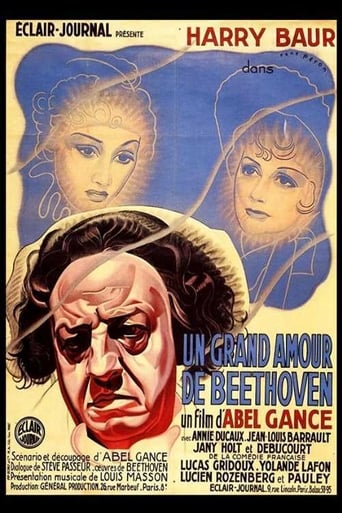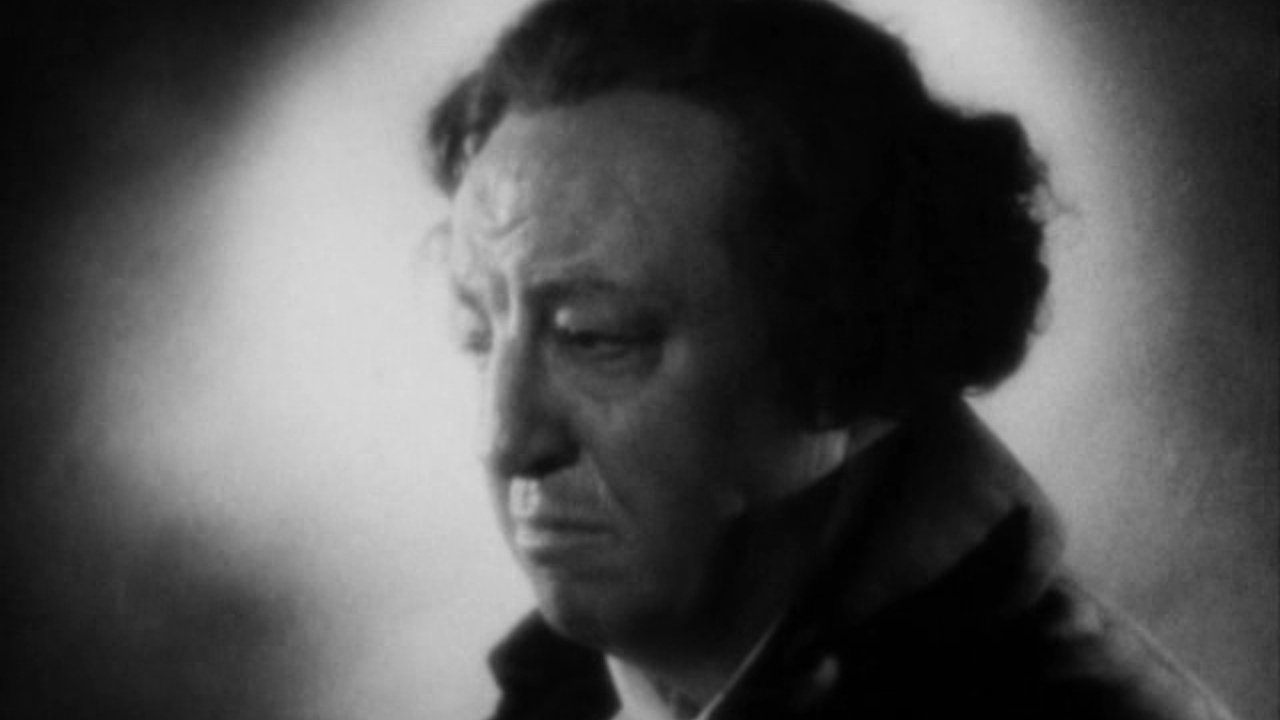clanciai
A disaster of a film. Everything is wrong. Nothing works, except the costumes, the one thing in the film which deserves admiration. Beethoven himself is totally unconvincing as a big fat lurch, while in reality he was small and inconspicuous. The intentions of the film are honest and good enough but fail miserably. The invented story is illustrated by the master's music, but the constant repetition of the first bars of the fifth symphony to point out the call of Beethoven's destiny becomes annoying for its debility. The film consists of exaggerations which spoil any possibility of any dramaturgy or realism. The final death scene is unbearably painful, since he never seems to die. The women cry incessantly all through the film turning it into a sentimental mess. They deserve better credit though than Harry Baur as Beethoven for at least being pretty and nice to look at. This is one of the most awkward films I have seen, perhaps though biased by the deeply convincing impression made by the outstanding Beethoven film with Gary Oldman 1994, a completely different version of "The Immortal Beloved" and also a total fake, but so much better and even realistically convincing. This effort to enthrone Beethoven as some kind of divine icon ("I believe in God and in Beethoven." - Richard Wagner, the motto of the film) is a total bathos of a turkey, and the intended apotheosis is only growing constantly more pathetic all the way. There are some sparkling moments, though, where Abel Gance's genius in spite of all succeeds in shining through, in fact, all the actors except Beethoven are quite good, especially the young Jean-Louis Barrault as the dashing nephew, but even in that case the film fails in making something out of the Beethoven drama. In reality, his nephew Karl tried to commit suicide, which was Beethoven's final spiritual death blow. It is not even hinted at here, and yet the film pretends to tell the story of Beethoven. It IS the story of Beethoven, but Beethoven himself is missing, and there is nothing in it but Abel Gance's absurdly vain pretensions. Sorry, any Beethoven film is better than this one.
writers_reign
As a rule biopics of composers have a tough time pleasing everyone; purists kvetch about chronological lapses, music lovers feel short-changed and the neutrals feel that less music and more story - fabricated or not - would be better all round. Having said that Abel Gance has made a very decent fist of Beethoven's life and work, helped considerably by having one of the finest actors in the business - in France or elsewhere - Harry Baur in the lead role. For some bizarre reason Gance is thought of as a 'silent' director as if he'd his career had come to a halt with the advent of sound, a sort of directorial equivalent of John Gilbert, whereas he made several excellent sound films, not least this one. For 1936 he uses some adventurous techniques not least the 'Disney' birds, lined up on a branch singing their hearts out to a Beethoven unable to hear. Today we may feel that Gance overdid the transition from silence to sound as he switches back and forth between Beethoven's and a general viewpoint but in 1936 it was the perfect visual image to illustrate the profound loss suffered by a genius. This movie, in black and white though it is, towers above such jokes as Stewart Granger's Paganini (The Magic Bow) and Dirk Bogarde's Liszt (Song Without End) and as for the blood on the keys in Cornel Wilde's Chopin (A Song To Remember) do we really want to go there. This is one that will take some beating.
jimi99
From the opening heart-wrenching scene that establishes the marriage of Beethoven's compassion with his extraordinary genius, to the transcendent death scene, The Great Love of Beethoven shows how adept Abel Gance could still be after the grandiosity and gimmickry of Napoleon. This film seems to owe much to the Surrealists, to Renoir, and to the Rembrandt biopic starring Charles Laughton, which I believe was a year or 2 before. The romantic nature of the man and how it both conflicted with and intensified his creative genius is at the center of the film, exploring his relationships in the most effective way: through the use of his timeless music. Of course Ludwig's gradual and intermittent deafness is a critical element of any such biography, and is conveyed by Gance brilliantly. In few films has such familiar and beloved music been used to capture the emotional content of the various moods and episodes of the artist's life, from the deepest melancholy to the gaiety of birdsong that Beethoven channels spontaneously to the delight of the children gathered around and the artist himself. Beautiful, sad, honest & important film...
Kermie-3
Following the incredible silent masterpiece "Napoleon," Abel Gance created another magnificent work of art in 1936, this time focusing on the brilliant composer Ludwig van Beethoven.While the film is filled with the creative camera work that characterized the style of Abel Gance, it goes one step beyond that of any of his previous works. It combines beautiful musical interludes with imagery that not only describe specific historical and biographical events in Beethoven's life, but also evoke the opposing inner emotions of happiness and anguish that troubled the deaf Beethoven during the prime of his life.Abel Gance's "Beethoven" is a perfect example of how the marriage of picture and sound can be used perfectly to form a creative masterpiece.


 AD
AD




